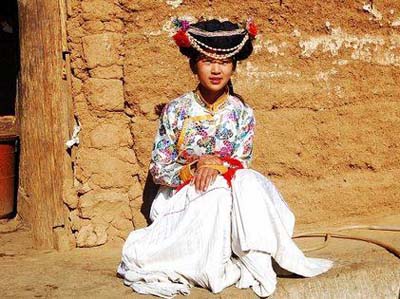Known to many as the Mosuo, but known often to themselves as the Na, the Mosuo are a small ethnic group living in Yunnan and Sichuan Provinces in China, close to the border with Tibet. Consisting of a population of approximately 40,000, most of them live in the Yongning region and around Lugu Lake, high in the Himalayas.
The Mosuo are a small minority with some unusual ideas about sex, marriage and the way society should be organized
 .
.
Daily life
Mosuo culture is primarily agrarian, with work based on farming tasks such as raising livestock (yak, water buffalo, sheep, goats, poultry) and growing crops, including grains and potatoes. The people are largely self-sufficient in diet, raising enough for their daily needs. Meat is an important part of their diet and, since they lack refrigeration, is preserved through salting or smoking. The Mosuo are renowned for their preserved pork, which may be kept for 10 years or more. They produce a local alcoholic beverage made from grain, called sulima, which is similar to strong wine. Sulima is drunk regularly and usually offered to guests and at ceremonies and festivals.
Mosuo homes consist of four rectangular structures arranged in a square, around a central courtyard. The first floor houses livestock, including water buffalo, horses, geese, and poultry. Animals may wander through the house during the day. The main cooking, eating and visiting areas are also on the first floor. The second floor is commonly used for storage and for the women’s private rooms; other family members sleep in communal quarters.
Role of women
As soon as a Mosuo female grows old enough, she les that she will perform for the rest of her life. Mosuo females do all the housework. This includes cleaning, tending the fire, cooking, gathering firewood, feeding the livestock, and spinning and weaving. In the past, due to isolation, Mosuo women produced all their own household goods. Today, due to increased trade with surrounding villages and cities, it is easier to attain goods. Nevertheless, some Mosuo women, especially those of older generations, know how to use looms to produce cloth goods.
Role of men
According to some, men have no responsibility in Mosuo society—they would have no jobs, rest all day, and conserve their strength for nighttime visits. However, Mosuo males do have important roles in their society. They are in charge of livestock and fishing, which they learn from their uncles and older male family members as soon as they are old enough.
Most importantly, males deal with the slaughter of livestock, in which women never participate. Slaughtered pigs, in particular, are kept whole and stored in a dry, airy place that keeps them edible for up to ten years. This is especially helpful when harsh winters make food scarce.
Source:
http://traditions.cultural-china.com/en/127Traditions13262.html





